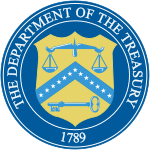This article needs additional citations for verification .(January 2022) |

The Community Development Financial Institutions Fund (CDFI Fund) promotes economic revitalization in distressed communities throughout the United States by providing financial assistance and information to community development financial institutions (CDFI). The CDFI Fund was originally established as an independent government corporation through the Riegle Community Development and Regulatory Improvement Act of 1994. [1] [2] Congress promptly moved the CDFI Fund under United States Department of the Treasury in a 1995 reconciliation bill. [2] Financial institutions, which may include banks, credit unions, loan funds, and community development venture capital funds, can apply to the CDFI Fund for formal certification as a CDFI.
Contents
In March 2025, President Trump issued an executive order that directed that the CDFI Fund be eliminated "to the maximum extent consistent with applicable law", along with several other agencies. [3] [4] [5]
